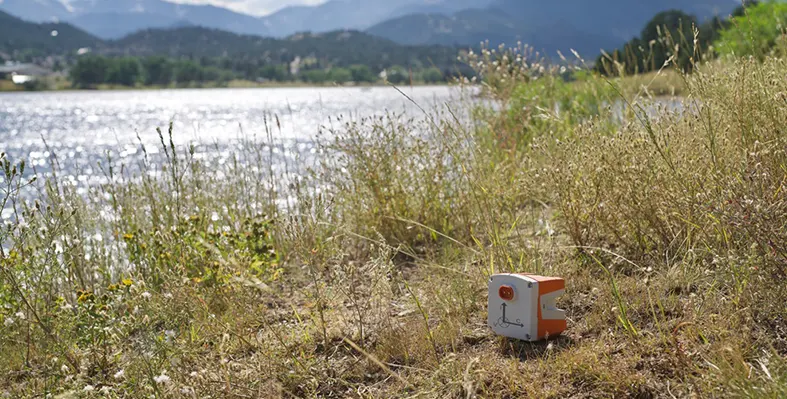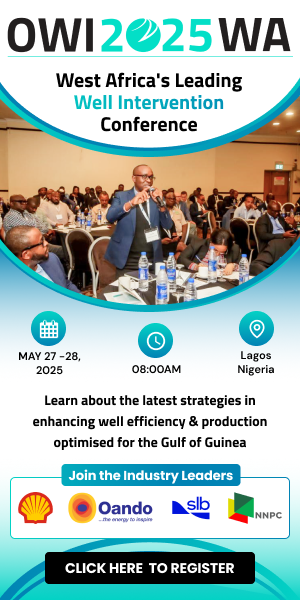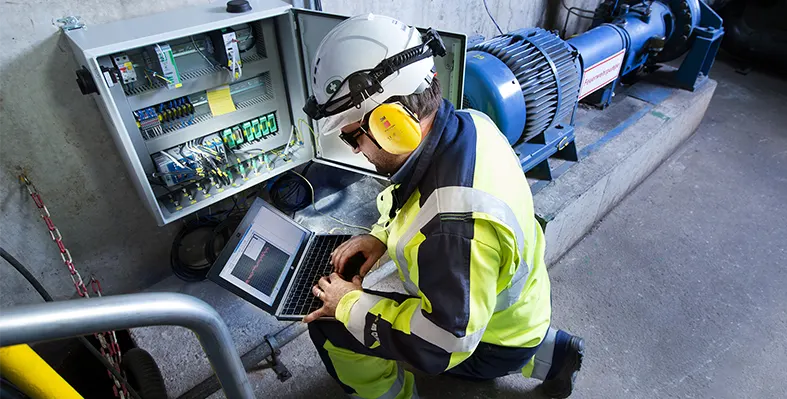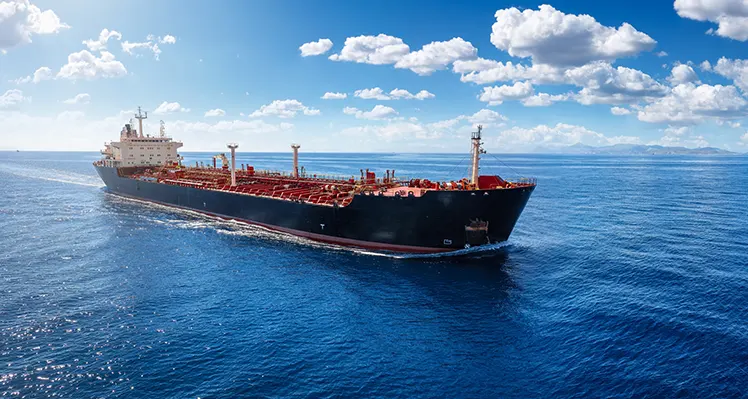In The Spotlight

The model addresses high-end seismic applications for today's energy and mineral E&P market. (Image source; Sercel)
Subsurface technology provider, Sercel's WiNG land seismic nodal solution now has a new three component version with the launch of the WiNG DFU-3C
Addressing the high-end seismic applications for today's energy and mineral E&P market, the integrated three-component node acquires the most comprehensive and high-definition data for outstanding imaging, characterisation and monitoring of the subsurface. As part of the WiNG range, it comes complete with unique advanced features as standard, such as the ultra-sensitive QuietSeis broadband digital sensor and Pathfinder transmission management technology. Combined with its market-leading compact and lightweight design, the DFU-3C offers unprecedented precision, efficiency and portability.
Jerome Denigot, CEO, Sercel said, "The WiNG DFU-3C is an excellent example of Sercel’s commitment to providing innovative and high-performance solutions to our customers. Building on the success of our widely used WiNG single-component node, this three-component version brings greater survey accuracy and flexibility. Its vector fidelity, sensor stability and low-frequency capabilities make the WiNG DFU-3C ideal for the most demanding E&P subsurface challenges, meeting the needs of our customers in both the energy and mining markets."
Seamless tubular solutions provider, Vallourec, will be supplying Algeria's national oil and gas company, SONATRACH, with oil country tubular goods (OCTG) threaded with its premium VAM connections that align with the Algerian market standards
To be delivered over this and the following year, the US$250mn worth supplies solidify Vallourec's already strong presence in the region.
These solutions will be manufactured across several Vallourec’s plants in Brazil, China, France, and Indonesia.
Optimising operations
“This notice of award further establishes Vallourec’s leadership in North Africa, a key region for our premium OCTG solutions. SONATRACH’S continued confidence in VAM connections, based on years of successful field performance, highlights the value we bring to its projects. Thanks to our global industrial footprint, we continue to support our customer in optimising their drilling operations while maintaining the highest standards of quality and reliability,” said Laurent Dubedout, senior vice president OCTG, Services and Accessories.
Also read
Vallourec to deliver multiple services for Total's Kaminho project
With an aim to boost liquefied petroleum gas' (LPG) market presence to 50% by 2030, Ghana’s downstream regulator the National Petroleum Authority (NPA) is promoting private-led investment across the petroleum value chain
Strengthened policies and technology-driven strategies are already bolstering downstream productivity, but the NPA is seeking greater investment to strengthen fuel security and distribution across West Africa.
During the Invest in African Energies: Accra Investor Briefing on April 14, 2025, taking place at the Kempinski Hotel, the NPA’s CEO Godwin Kudzo Tameklo will outline strategies being implemented by the authority to strengthen the downstream value chain in Ghana. Tameklo is expected to highlight ongoing efforts to attract investment in downstream projects, while sharing an update on the country’s developments such as the Integrated Petroleum Hub, LPG expansion and broader infrastructure advancements.
As the downstream regulator, the NPA manages the importation and refining of crude in Ghana as well as the sale, marketing and distribution of refined petroleum products across the country. The NPA works to position the downstream sector as both a major contributor to domestic product growth and catalyst for long-term economic growth in Ghana. By leveraging technology and growth-centered policy, the NPA has led the growth of Ghana’s downstream industry.
In April 2024, the country witnessed a 15.4% growth in petroleum consumption, reaching 1,641 kilotons compared to 2023, as well as a 9% rise in gasoline consumption, reaching 588.5 kilotons. In 2024, LPG consumption also witnessed a surge, rising 7.25% throughout the year to reach 340 million liters. An increase in the adoption of LPG was largely attributed to the promotion of the Cylinder Recirculation Model by the NPA – a distribution system implemented in 2023 that allows residents and commercial consumers to utilize LPG through cylinder exchange. LPG adoption rose from 28.9% in 2010 to 60% in 2023, with LPG usage increasing from 18.2% in 2010 to 44.1% in 2023. Strategic LPG projects include the Puma Energy-owned LPG bottling plant in Tema – a $6 million facility with the capacity to deliver 1,200 cylinders per hour. A second plant is being developed by the Ghana Cylinder Manufacturing Company, with a capacity of 150 million cubic feet per day.
To further strengthen distribution, the NPA is leveraging innovative technology and policies that enhance efficiency and profitability across the downstream sector. These include the introduction of a new transparent automatic price adjustment formular, transitioning from an annual regulated pricing model; a zero-tolerance policy for toxic fuel and an increase in low sulphur fuels; as well as technology-based mechanisms such as the petroleum marking scheme, bilk road vehicle tracking project, electronic cargo tracking system and enterprise relational database management software. These mechanisms support efficient monitoring and ensure optimized quality and quantity of petroleum products in Ghana.
Beyond domestic petroleum distribution, Ghana is strengthening regional exports. In 2024, the NPA signed an agreement with Senegal and The Gambia to enhance petroleum product exports. Ghana already exports petroleum to regional neighboring, including Mali, Niger, Burkina Faso, Ivory Coast and Togo. According to the NPA, the volume of petroleum exports to regional countries from Ghana amounted to 385,154,100 liters. Over 5,000 service providers are registered in Ghana, delivering over four million metric tons of petroleum products annually.

The report provides expert insights to help oil and gas professionals navigate digital transformation with confidence. (Image source: DataPARC)
A new report from dataPARC, produced in association with Oil Review Middle East, provides essential guidance to help oil and gas professionals navigate the industrial analytics landscape with confidence
Industrial analytics are transforming operations in the oil and gas sector, providing actionable insights to enhance operational efficiency and facilitate better and faster decision-making. The market is constantly evolving, with AI and machine learning are ushering in a new era of predictive and prescriptive solutions, automation and autonomous operations, and AI tools increasingly taking on a lot of the heavy lifting.
With many players in the industrial analytics space, companies looking to migrate from legacy systems, or looking to upgrade their capabilities, will need to take a number of factors into account when selecting a new system, from ease of integration and conversion to advanced analytics capabilities and licensing.
This report provides guidance on selecting a new platform, identifying the criteria that need to be taken into consideration and the main features that should be looked for. It highlights the strengths of the dataPARC platform, and gives real-world examples of how industrial analytics are transforming operations in the oil and gas sector, through illustrative case studies.
Whether you're looking to replace legacy tools such as ProcessBook or explore AI-powered analytics, this report delivers the strategies, comparisons, and case studies you need to move forward.
Why download the report?
• A clear roadmap for smarter industrial analytics
• Real-world success stories from oil & gas operations
• Actionable insights for IT/OT leaders
• Expert guidance from a proven global provider
Don’t miss this opportunity to lead your organisation toward greater operational efficiency.
Download the report now and start driving meaningful change with dataPARC.
Norwegian seismic firm TGS has completed reprocessing work on data that it hopes will spur renewed interest in Angola’s forgotten deepwater Block 16
The company has announced that it had finished work on the Block 16 GeoStreamer MC3D seismic dataset in the Lower Congo Basin, in partnership with Agência Nacional de Petróleo, Gás e Biocombustíveis (ANPG).
Exploration in the deepwater Lower Congo Basin has experienced a resurgence in recent years, TGS reported, with numerous significant discoveries being made and rapidly brought on stream.
"This 3,684-sq-km rejuvenation project utilises modern depth processing workflows to deliver enhanced imaging beyond the original data, enabling detailed evaluation of deeper target plays in both post-salt and pre-salt sections,” it said in a statement.
Angola’s Block 16 has remained largely under explored since the early 2010s, however, with the most recent exploration well drilled in 2013. Until recently, publicly-known oil and gas discoveries within Block 16, in the latest dataset, were limited to the Bengo (1994) and Longa (1995) Upper Miocene finds in the northern section.
However, TGS said that a recent re-evaluation of wells in the Lower Congo Basin has identified oil recovery from Upper Miocene reservoirs in the southern part of the survey area. The survey also provides partial coverage of the field, a marginal field development opportunity currently being marketed by ANPG.
Discovered in 2003, Tchihumba contains hydrocarbon-bearing zones within Upper Miocene, Lower Miocene and Oligocene sands, with recoverable volumes estimated at approximately 136mn barrels.
Additionally, the Lumpembe-1 oil discovery on Block 15/06, drilled in 2023 and currently undergoing development studies, falls within the survey’s coverage.
“TGS is very pleased to continue our support of exploration in this region with our high-quality seismic data,” said David Hajovsky, executive vice president multi-client, TGS. “These accumulations, along with the proximity of significant neighbouring discoveries, present strong opportunities for future exploration success.”
Other West African projects TGS has completed recently include an enhancement of its Fusion 3D seismic dataset offshore Sierra Leone, focusing on the Vega prospect.
Recent discoveries in South America have intensified interest in this region, TGS stated late last year, positioning Sierra Leone as a promising new exploration frontier.
“With growing interest from international oil companies and independents, the Fusion 3D data comes at a crucial time.”
TGS also signed an agreement last year to enhance datasets in Mauritania with the Ministère du Pétrole, des Mines et de l’Énergie, strengthening its position as the sole provider of multi-client subsurface data in the country.
Read more offshore Angola news here:
Red Sky Energy signs risk service contract on Angola Block 6-24
Cabgoc's Sanha project achieves first gas offshore Angola
Sequa Petroleum to acquire interests in multiple blocks in Angola

The model addresses high-end seismic applications for today's energy and mineral E&P market. (Image source; Sercel)
Subsurface technology provider, Sercel's WiNG land seismic nodal solution now has a new three component version with the launch of the WiNG DFU-3C
Addressing the high-end seismic applications for today's energy and mineral E&P market, the integrated three-component node acquires the most comprehensive and high-definition data for outstanding imaging, characterisation and monitoring of the subsurface. As part of the WiNG range, it comes complete with unique advanced features as standard, such as the ultra-sensitive QuietSeis broadband digital sensor and Pathfinder transmission management technology. Combined with its market-leading compact and lightweight design, the DFU-3C offers unprecedented precision, efficiency and portability.
Jerome Denigot, CEO, Sercel said, "The WiNG DFU-3C is an excellent example of Sercel’s commitment to providing innovative and high-performance solutions to our customers. Building on the success of our widely used WiNG single-component node, this three-component version brings greater survey accuracy and flexibility. Its vector fidelity, sensor stability and low-frequency capabilities make the WiNG DFU-3C ideal for the most demanding E&P subsurface challenges, meeting the needs of our customers in both the energy and mining markets."
The deepest offshore development in Africa, GTA in Mauritania and Senegal generated the first cargo of liquefied natural gas (LNG) for bp to be sent for export markets
First gas had flown from the GTA Phase 1 project earlier this year.
A project considered of strategic national importance, GTA Phase 1 boasts gas resources of approximately 2.4 mn tonnes of LNG per year of which considerable gas volumes are allocated for the domestic markets in both countries.
“This is a very proud day for Mauritania and Senegal. Throughout the development of this project, we have built strong relationships with the project’s host governments, local communities and our partners, and we look forward to strengthening these in years to come as we continue ongoing operations,” said Dave Campbell, bp's senior vice president for Mauritania and Senegal.
This first cargo of LNG at GTA is the third upstream major project start-up of the year for bp. These are the first of 10 expected by the end of 2027, in line with bp’s strategy of growing its upstream oil and gas business.
“This first cargo from Mauritania and Senegal marks a significant new supply for global energy markets. Starting exports from GTA Phase 1 is an important step for bp and our oil and gas business as we celebrate the creation of a new production hub within our global portfolio.
“This is the culmination of years of work from the entire project and operations teams – congratulations to all who were involved in safely reaching this landmark. I would also like to thank the governments of Mauritania and Senegal, and our partners – Kosmos Energy, PETROSEN and SMH – for their ongoing support and collaboration,” said Gordon Birrell, executive vice president, production & operations.
The first shipment of LNG was transferred to a carrier from the project’s floating liquefied natural gas (FLNG) vessel located 10 kilometres offshore, where the natural gas had been cryogenically cooled, liquefied and stored.
With an aim to boost liquefied petroleum gas' (LPG) market presence to 50% by 2030, Ghana’s downstream regulator the National Petroleum Authority (NPA) is promoting private-led investment across the petroleum value chain
Strengthened policies and technology-driven strategies are already bolstering downstream productivity, but the NPA is seeking greater investment to strengthen fuel security and distribution across West Africa.
During the Invest in African Energies: Accra Investor Briefing on April 14, 2025, taking place at the Kempinski Hotel, the NPA’s CEO Godwin Kudzo Tameklo will outline strategies being implemented by the authority to strengthen the downstream value chain in Ghana. Tameklo is expected to highlight ongoing efforts to attract investment in downstream projects, while sharing an update on the country’s developments such as the Integrated Petroleum Hub, LPG expansion and broader infrastructure advancements.
As the downstream regulator, the NPA manages the importation and refining of crude in Ghana as well as the sale, marketing and distribution of refined petroleum products across the country. The NPA works to position the downstream sector as both a major contributor to domestic product growth and catalyst for long-term economic growth in Ghana. By leveraging technology and growth-centered policy, the NPA has led the growth of Ghana’s downstream industry.
In April 2024, the country witnessed a 15.4% growth in petroleum consumption, reaching 1,641 kilotons compared to 2023, as well as a 9% rise in gasoline consumption, reaching 588.5 kilotons. In 2024, LPG consumption also witnessed a surge, rising 7.25% throughout the year to reach 340 million liters. An increase in the adoption of LPG was largely attributed to the promotion of the Cylinder Recirculation Model by the NPA – a distribution system implemented in 2023 that allows residents and commercial consumers to utilize LPG through cylinder exchange. LPG adoption rose from 28.9% in 2010 to 60% in 2023, with LPG usage increasing from 18.2% in 2010 to 44.1% in 2023. Strategic LPG projects include the Puma Energy-owned LPG bottling plant in Tema – a $6 million facility with the capacity to deliver 1,200 cylinders per hour. A second plant is being developed by the Ghana Cylinder Manufacturing Company, with a capacity of 150 million cubic feet per day.
To further strengthen distribution, the NPA is leveraging innovative technology and policies that enhance efficiency and profitability across the downstream sector. These include the introduction of a new transparent automatic price adjustment formular, transitioning from an annual regulated pricing model; a zero-tolerance policy for toxic fuel and an increase in low sulphur fuels; as well as technology-based mechanisms such as the petroleum marking scheme, bilk road vehicle tracking project, electronic cargo tracking system and enterprise relational database management software. These mechanisms support efficient monitoring and ensure optimized quality and quantity of petroleum products in Ghana.
Beyond domestic petroleum distribution, Ghana is strengthening regional exports. In 2024, the NPA signed an agreement with Senegal and The Gambia to enhance petroleum product exports. Ghana already exports petroleum to regional neighboring, including Mali, Niger, Burkina Faso, Ivory Coast and Togo. According to the NPA, the volume of petroleum exports to regional countries from Ghana amounted to 385,154,100 liters. Over 5,000 service providers are registered in Ghana, delivering over four million metric tons of petroleum products annually.
The East Africa Energy Cooperation Summit (EA-ECS), taking place 29-30 January in Arusha, Tanzania, will be uniting the region's energy independent poiwer producers (IPPs) and engineering, procurement, construction and financing contract (EPCF) stakeholders to discuss the region's investment potential and innovations taking place in the industry
The event will delve into the success stories, including the Ethiopia-Kenya electricity highway, highlighting the role of cross-border collaboration for economic and social development.
Led by Ministers from across the EAC and large-scale energy users, over two days, the Arusha Summit will deep dive into opportunities for the private sector, advocating for a diversified energy mix to maintain grid stability to support major industrial growth, as well as C&I generation.
“Energy is a pillar for development and growth and is crucial for the functioning of the economies of the EAC Partner States. The East Africa Energy Cooperation Summit will serve as the ideal platform for advancing projects and bringing tangible changes in the industry,” said Andrea Malueth, deputy secretary general (Infrastructure, Productive, Social & Political Sectors), East African Community Secretariat.
“Ten years from now, the EAC’s middle classes will have more job stability, more opportunities, and more disposable income than ever before. New railways, industries, ports, and tourism will position the region as the number one investment destination globally, taking the title back from both parts of Asia and Latin America,” said Elisa Palmioli, producer, EnergyNet, which is organising the event.






























































